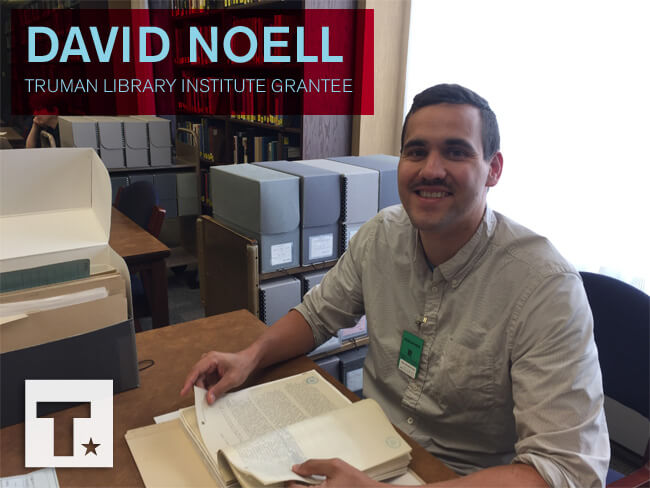Meet Research Grant Recipient David Noell | September 1, 2017

Each year some two dozen historians, writers and scholars receive Research Grants to explore the archives at the Harry S. Truman Library and Museum. These prestigious research grants are made possible thanks to the generosity of Truman Library Institute members and donors.
Donors have made it possible for the Truman Library Institute to give out nearly $2.7 million over the years for researchers all over the world to travel to Independence to immerse themselves in archival research and further our understanding of the Truman era.
Meet one of these grantees, Ph.D. Candidate David Noell, who recently traveled to the Truman Library from Columbia University to study the intellectual history of private property during the Truman era. We took a few minutes of David’s time to learn about his research and what he learned while on site at the Truman Library.
Tell us a bit about your research project.
I am working on my dissertation, which is a history of American religious broadcast policy, both domestic and international. During my time at the Truman Library, I focused on early Cold War religious policy at the Voice of America (VOA) and Radio Free Europe (RFE). I was particularly interested in discovering which religious leaders were advising the staff at these international broadcasters and how they shaped policy, with an eye towards how religious institutions had influence on American propaganda efforts.
Why do you think it’s important to study Truman-era history?
Truman’s time as president marks the foundation of the Cold War, and therefore is vastly important history to study. His administration put in place international information policy that would be influential for years to come in the Cold War, a conflict that, in many ways, was defined more by psychology and propaganda than by tanks or missiles. Moreover, we have to understand Truman-era religious history if we are to understand how religion became such a powerful tool of propaganda for America in the Cold War.
What is the coolest discovery (or discoveries) you found during your research at the Truman Library? What does that discovery mean to your research?
While at the Truman Library I discovered difficult-to-track-down names of religious advisers on international propaganda, particularly at RFE. I also found more evidence for how domestic religious groups put pressure on international broadcasters to mold policy to their liking. These discoveries are significant in leading me where to look next in my search for how religious policy was formed at RFE and VOA. Most importantly for my research, my time at the Truman Library confirmed that religious policy advisers existed, that they had influence, and that their appointment had meaning for the domestic religious battles of the time.
What did it mean to be awarded a Truman Library Institute Research grant?
The Truman Library Institute Research grant is indispensable for my work. It allowed me to make a significant step forward in my dissertation research and find information that I was not expecting but was exceedingly helpful. For all of this, I am very grateful.
Thank you to the generous members and donors who have made it possible for David to conduct his research! Are you interested in ensuring that important research like this continues? Donate today.
Join our email list to receive Truman updates right in your inbox:


